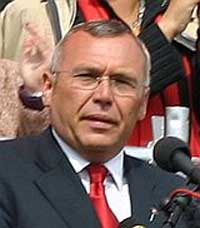Austria and Israel: troubled history improved?

“A new chapter” in Austria-Israeli emotional and often strained relationship was pledged by Chancellor Alfred Gusenbauer on Monday when he kicked off a two-day visit to the Jewish country.
Gusenbauer's visit is the first to Israel by an Austrian head of government in close to a decade and only the third since the country was founded in the wake of the Nazi Holocaust. Ties have often been strained because of Austria's alliance with Germany during World War II.
"It's true that the relationship between Austria and Israel not always has been an easy one, but I think we are embarking on a new initiative," Gusenbauer said at a red-carpet welcome ceremony at the office of Prime Minister Ehud Olmert. "We are opening up a new chapter in our relationship, a chapter of friendship and cooperation," he said, speaking in English.
The Austrian leader started his day with a visit to Yad Vashem, Israel's Holocaust museum and memorial, where he stood for a moment in silence and laid a wreath in memory of the six million European Jews killed by the Nazis.
"I'm very moved by my visit to Yad Vashem," he wrote in the visitors' book. "It reminds us of the incredible brutality that man is able to exercise. It reminds us to be vigilant against all forms of racism and anti-Semitism ... It reminds us of our responsibility to safeguard the security of Israel and its neighbors, to secure the rebirth of the Jewish people."
Many Austrians enthusiastically supported the Austrian-born Nazi leader Adolf Hitler and about 70,000 Austrian Jews were killed in the Holocaust. For years Austria rejected responsibility for the persecution of Jews on its territory, arguing that it became the first victim of German aggression when Hitler annexed Austria in 1938.
Franz Vranitzky was the first Austrian chancellor to visit Israel, in 1993, in a tentative thawing of relations after the six-year term of Kurt Waldheim, who served during World War II as a junior army officer in a Nazi army unit in Yugoslavia. Waldheim said he had not been involved in any wrongdoing during his service in the Balkans, but Israel downgraded relations in protest.
Vranitzky made an explicit acknowledgment of Austria's role in the Holocaust during his 1993 visit to Jerusalem when he said that Austrians helped the Nazi regime to function and must beg forgiveness.
In March 1998 then-chancellor Viktor Klima said during a trip to Jerusalem that ties between the two countries were improving in the light of Austria's attempts to look more honestly at its Nazi past, but relations took a downturn two years later when Israel recalled its ambassador from Vienna in protest at the inclusion of the extreme right-wing Freedom Party in the federal government.
Subscribe to Pravda.Ru Telegram channel, Facebook, RSS!




